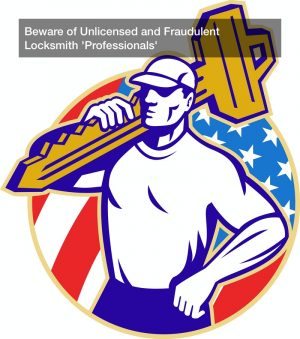
Updated 9/22/20
There are plenty of good people in this world, even if it doesn’t seem so at times. Unfortunately, there are just as many — if not more — people who are more interested in taking advantage of people than actually doing any good.
There are all kinds of dishonest schemes out there that range from simply posing as a professional to something much more elaborate.
One type of scam that’s gaining some serious momentum across the U.S. and Canada involves unlicensed or fraudulent locksmiths taking advantage of homeowners and business owners.

Over the past five years, the locksmiths’ industry has seen a 1.2% increase in the number of employees. Unfortunately, there has been an uptick in phony businesses, fake invoices, unneeded lock removals, and all kinds of problems as locksmith scammers rip off customers and legitimate businesses alike.
“I have two locks so at first he tried to pick them and then he said, ‘Oh, this is a seven-pick lock — it’s really complicated so I’ll have to drill it out,'” said Christine MacInnes, who hired a locksmith after finding an ad online once she was locked out of her house. “And I just thought, ‘Do what you have to do, I need to get in.’ He ended up charging me $540 for everything.”
MacInnes said that the so-called professional locksmith knew he could take advantage of her because she had a baby on her hands and needed to get into her home right away.
“He knew he could do whatever he wanted and charge me whatever he wanted,” she added. “I felt so vulnerable, and I’m sickened by the fact that he did that to me and probably many others as well.”
But that isn’t the only form of locksmith scheme that we’ve seen. What if you lock yourself out of your car? Not everyone knows how to get the keys out of your locked car so relying on a professional is key. As such. automobile locksmiths are another essential service when you’re locked out of your car. No one wants to break their window and few people have the funds to pay for such an expensive repair.

When you lock yourself out of your car, you should only rely on reputable sites so as to not get taken advantage of by schemers and liars online. Avoid sites like Craigslist and Facebook Marketplace. Though the people posting ads on those sites may seem reputable, it’s always better to go with a trusted business backed by reliable reviews. It can be stressful when you’re stuck in a store parking lot, but it’s better to be safe than sorry.
Another alternative is investing in a locksmith kit. These locked out of your car kits are vital if you accidentally lock yourself out at home. While this won’t really help you while you’re on the road, giving a kit to a family member will also ensure you have someone to call when you’re in a tight spot. It’ll also prevent you from falling for a locksmith scheme.
In addition to locksmith schemes, since homeowners remodel more than 10.2 million kitchens and 14.2 million bathrooms annually, criminals often pose as legitimate remodeling contractors and take advantage of people — especially senior citizens. Though criminals will try and scam anyone, they frequently target the elderly. And since 63% of Americans plan on working after retirement age, there are plenty of break-in and locksmith scam opportunities for criminals North America. In addition to posing as locksmiths, contractors, and other maintenance professionals, there are all kinds of scams against the elderly.
Here are some of the most common fraudulent schemes — other than locksmith schemes — that impact seniors:
- Prescription Drug Scams — Since seniors often take a myriad of prescription medications, they are at risk of falling victim to this kind of scheme. Fraudulent scammers will try to pose as credible pharmacists, selling fake medications to the elderly or will simply just take their financial information.
- Investment Scams — For those elderly Americans who are able to retire, many of them often look for investment opportunities to expand. Unfortunately, scammers are aware of this, as well. There are plenty of “investment opportunities” out there (buying nonexistent vacant property, giving money to fake businesses, ect.) that don’t offer a return at all.
- Charity Scams — Sadly, criminals aren’t exactly known for their moral compasses. Scammers will pose as charity workers, contact an elderly individual, and conjure up a sad story which, of course, concludes with asking for money.

No matter your age, location, or occupation; it’s imperative to not only use secure locks on your home, business, and vehicle, but to only work with experienced, reliable, and legitimate professional services. Always check out a prospective company’s reputation, never pay exclusively in cash, and use your best judgment.
If you suspect any suspicious activity that could be a financial scam, whether it’s in your neighborhood, over the Internet, or in your home, contact the authorities right away. Rely on these tips to avoid common schemes, especially locksmith schemes.

